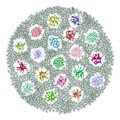In places where discourse about the internet exercises now familiar postmodern moves, one finds some of the most peculiar notions about the underlying technology. It's not uncommon to hear technical protocols like TCP/IP described as mechanisms of political oppression and social control. But most of all one hears gushing descriptions of unprecedented revolution and radical paradigm shifts. And network based art is posited nothing less than the ultimate requiem for the author a la Barthes.
It seems to me it's time for some careful, and even skeptical, thought about how revolutionary the network experience really is. And I mean this in both a technological and intellectual sense.
In the early 70's I was able to create software that ran on a networked system called PLATO. It already had, albeit with less power, essentially all of the networking features many think of as new and world changing. These included: bit mapped graphics, linking and hypertext, graphics, sound, an easy to use scripting/programming language, and user definable fonts.
But most of all PLATO had an online community. It allowed multi-user real-time interaction across an international network. PLATO included what we now call bulletin boards, email, chat rooms, instant messaging, screen sharing, and even emoticons. And, of course, the killer app - interactive multi-user games. Again, all of this in the early 70's and some even a bit before.
I've always suspected that if PLATO had been born on a coast rather than in the midwest (University of Illinois) on midwestern hardware (Control Data Corp.) it would be better remembered. But that's not why I'm posting about it here.
Many of those with non-trivial exposure to PLATO came away with the same lessons being rediscovered today. First, people are much more interested in interacting with other people than with machines. (Perhaps that will change if we ever build Turing test-worthy machines.) Second, modes of human communication in and out of real-time are different, and each has its own virtues. Third, computer mediated experiences work best when they are small, distributed, independently developed, and interlinked rather than monolithic and controlled from the top down.
But how much of this new wisdom is really new, and how much of it is about networks per se? People have put interaction with other humans first both before and after networks. We've known that real-time and time-delayed modes of human communication are different and yet equally useful both before and after networks. And it's a basic insight from complexity science that human society is best understood as a bottom up process, whether the medium of communication is digital, analog, or shouts and smoke signals.
If so little of this is truly revolutionary why did PLATO ultimately fail while the web succeeded beyond its inventors wildest dreams? It wasn't due to a lack of vision on the part of its creators. Both have similar roots in education and research with an eye to the public good. And it certainly wasn't due to a lack of critical theory, deconstruction, and so on. Both PLATO and the Web happily sprang into being without needing to consult the canons of postmodern thought.
Ultimately it came down to mundane economics. The perceived value of PLATO was out of whack with its cost. The Web persisted and grew because the cost of the technology had finally ducked under the corresponding price threshold.
Those commenting on the growth of the internet should keep at least one foot on the ground. It's not that I think there is nothing new under the sun, although there is some of that. It's mostly that the breathless hyperbole I so often hear from those in the humanities regarding the network experience sounds awfully naive. It will not wear well over time. For some of us it doesn't even wear well now.
Networked art is possible now mostly because of economic reasons, not because social structures have been overturned, hierarchies questioned, authorship problematized, and so on. Certainly such critical issues are worth consideration, but I would argue they are mostly orthogonal to the growth of the network.
p.s. for more info about PLATO the wikipedia entry is actually pretty good:
http://en.wikipedia.org/wiki/PLATO_(computer_system)
Saturday, October 11, 2008
Subscribe to:
Posts (Atom)
